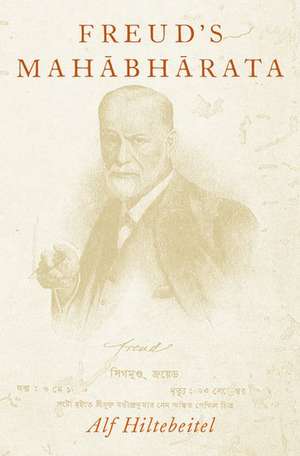Freud's Mahābhārata
Autor Alf Hiltebeitelen Limba Engleză Hardback – 27 sep 2018
Preț: 457.42 lei
Preț vechi: 630.47 lei
-27% Nou
Puncte Express: 686
Preț estimativ în valută:
87.54€ • 90.84$ • 73.17£
87.54€ • 90.84$ • 73.17£
Carte tipărită la comandă
Livrare economică 05-11 martie
Preluare comenzi: 021 569.72.76
Specificații
ISBN-13: 9780190878337
ISBN-10: 0190878339
Pagini: 328
Dimensiuni: 239 x 160 x 28 mm
Greutate: 0.6 kg
Editura: Oxford University Press
Colecția OUP USA
Locul publicării:New York, United States
ISBN-10: 0190878339
Pagini: 328
Dimensiuni: 239 x 160 x 28 mm
Greutate: 0.6 kg
Editura: Oxford University Press
Colecția OUP USA
Locul publicării:New York, United States
Recenzii
This volume, with its companion, will be of high interest to students of religion, psychoanalysis, and psychology, as well as those interested in comparative literature ... Recommended.
Alf Hiltebeitel's scholarship on the Sanskrit epic Mahabharata and its living presence in Tamil-speaking communities in South India has shaped the field of Mahabharata studies for a generation, and his latest offering expands the scope of his oeuvre even further.
Spectacularly impressive. You can dip into these amazing volumes and find all manner of marvelous things--not only the valuable information about Freud, Bose, goddesses, and the Mahābhārata, but Hiltebeitel's highly creative ideas about them.
These volumes comprise the magnum opus of a distinguished historian of religions. It lovingly orbits around two cultural oeuvres of roughly the same length: the great Hindu epic of the Mahābhārata and the Collected Works of Sigmund Freud. It is as if Hiltebeitel has treated the Mahābhārata as one immense psychoanalytic exploration of the maternal polytheisms of Indian Hindu culture and the Collected Works as an unintended but appropriate mythology of Western civilization and its male monotheisms. Behind this astonishing comparison haunts the question: 'Can psychoanalytic methods work in different ontological structures? Can they work here, for example, in the panpsychic nondualism of the Bengali founder of Indian psychoanalysis Girindrasekhar Bose?' The answer appears to be: 'Yes, they can, uncannily so. And the analysis goes both ways.'
At a time when scholarship in both religion and psychoanalysis seeks to recover a repressed or marginalized anti-colonial past, Hiltebeitel's manuscript offers a wealth of information which scholars of both religion and psychoanalysis will find fascinating and stimulating. This is the kind of research that stimulates more research.
Alf Hiltebeitel's scholarship on the Sanskrit epic Mahabharata and its living presence in Tamil-speaking communities in South India has shaped the field of Mahabharata studies for a generation, and his latest offering expands the scope of his oeuvre even further.
Spectacularly impressive. You can dip into these amazing volumes and find all manner of marvelous things--not only the valuable information about Freud, Bose, goddesses, and the Mahābhārata, but Hiltebeitel's highly creative ideas about them.
These volumes comprise the magnum opus of a distinguished historian of religions. It lovingly orbits around two cultural oeuvres of roughly the same length: the great Hindu epic of the Mahābhārata and the Collected Works of Sigmund Freud. It is as if Hiltebeitel has treated the Mahābhārata as one immense psychoanalytic exploration of the maternal polytheisms of Indian Hindu culture and the Collected Works as an unintended but appropriate mythology of Western civilization and its male monotheisms. Behind this astonishing comparison haunts the question: 'Can psychoanalytic methods work in different ontological structures? Can they work here, for example, in the panpsychic nondualism of the Bengali founder of Indian psychoanalysis Girindrasekhar Bose?' The answer appears to be: 'Yes, they can, uncannily so. And the analysis goes both ways.'
At a time when scholarship in both religion and psychoanalysis seeks to recover a repressed or marginalized anti-colonial past, Hiltebeitel's manuscript offers a wealth of information which scholars of both religion and psychoanalysis will find fascinating and stimulating. This is the kind of research that stimulates more research.
Notă biografică
Alf Hiltebeitel is Professor Religion at George Washington University. He works mainly on the two Sanskrit epics, the Mahābhārata and Ramayana, and on the south Indian Draupadi cult, which worships the Mahabharata's leading heroine as the Goddess. He is a historian of religions who studies Hinduism with longstanding interests in Sigmund Freud and in the comparative study of Judaism.
